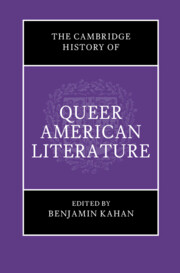Book contents
- The Cambridge History of Queer American Literature
- The Cambridge History of Queer American Literature
- Copyright page
- Contents
- Figures
- Tables
- Contributors
- Acknowledgments
- Introduction
- Part I Synchronic Histories of American Sexuality
- The Sexuality of American History
- Queer Literary Movements
- 9 Trans-ing Transcendentalism
- 10 Sentimental Literature and the Erotics of Identification
- 11 Queer Modernism and Misfit Identity
- 12 Imperialism and the Queer Harlem Renaissance
- 13 The Mystical Sexuality of the Beats and the Berkeley Renaissance
- 14 The New York School’s Queer Happiness
- 15 Chicana and Latina Lesbian Feminists and the Radical Making of Anthological Archives of Willfulness
- 16 Queer Literature after Queer Theory
- Part II Diachronic Histories of American Sexuality
- Part III Queer Methods
- Index
9 - Trans-ing Transcendentalism
from Queer Literary Movements
Published online by Cambridge University Press: 17 May 2024
- The Cambridge History of Queer American Literature
- The Cambridge History of Queer American Literature
- Copyright page
- Contents
- Figures
- Tables
- Contributors
- Acknowledgments
- Introduction
- Part I Synchronic Histories of American Sexuality
- The Sexuality of American History
- Queer Literary Movements
- 9 Trans-ing Transcendentalism
- 10 Sentimental Literature and the Erotics of Identification
- 11 Queer Modernism and Misfit Identity
- 12 Imperialism and the Queer Harlem Renaissance
- 13 The Mystical Sexuality of the Beats and the Berkeley Renaissance
- 14 The New York School’s Queer Happiness
- 15 Chicana and Latina Lesbian Feminists and the Radical Making of Anthological Archives of Willfulness
- 16 Queer Literature after Queer Theory
- Part II Diachronic Histories of American Sexuality
- Part III Queer Methods
- Index
Summary
This essay revisits Emerson’s iconic transparent eyeball passage to rethink it as a moment of crossing over into queer embodiment and sensory expansion. If “trans” is “to move across” and “scandre” to climb, the point is not to rise above the physical world, but to move into it in such a way as to be in touch with its divine energies. To do so was to climb out of the enclosure and isolation of subjectivity and inhabit something much more capacious. Expanding the scope of Transcendentalism proper, the essay tracks this queer “I” into a number of other texts in which a similar experience or phenomenon of ecstasy opens onto novel social, sexual, and gender understandings. Margaret Fuller, Margaret Sweat, women trance writers, Walt Whitman, and Harriet Jacobs animate the “trans-” in Transcendentalism in their critical crossings and dynamic reassemblages of body and soul, self and other, and sex, gender, and race.
Keywords
- Type
- Chapter
- Information
- The Cambridge History of Queer American Literature , pp. 173 - 191Publisher: Cambridge University PressPrint publication year: 2024

